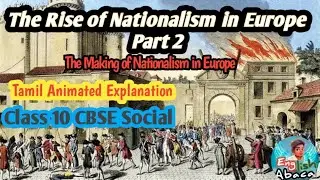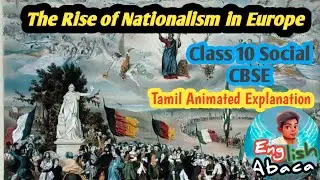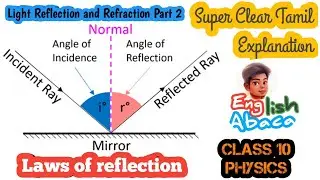The Rise of Nationalism in Europe Part 2 The Making of Nationalism in Europe Tamil Explanation
The Making of Nationalism in Europe
The Rise of Nationalism in Europe- So, now we will have a look at the making of Nationalism in Europe. But before that we need to understand the composition of Europe that was divided into various kingdoms, the Dutchies and Cantons were ruled by those rulers who had their autonomous territories.
The Rise of Nationalism in Europe Part 2 The Making of Nationalism in Europe Video Explanation
Germany, Italy, and Switzerland were divided into kingdoms, duchies, and cantons. They were ruled by different rulers. Eastern and Central Europe was under autocratic kingdoms within the territories of which lived diverse people.
These people had nothing in common. They did not share any collective identity or a common culture. All of them had different languages and were from different ethnic groups.
For example, the Habsburg Monarchy that had its rule over Austria- Hungary was composed of different regions and people.It included Alpine regions- Tyrol, Austria, Sudetenland and Bohemia.
In these areas, the aristocrats were German-speaking whereas it also included Lombardy and Venetia where people spoke Italian.
On the other hand in Hungary half of the population spoke Magyar while the other half spoke a variety of dialects.
In Galicia the aristocrats spoke Polish. Even the peasants that lived in these areas were from different ethnic groups.
or example,there were Bohemians and Slovaks in the north, Slovenes in Carniola, Croats in the south, Roumans to the east in Transylvania.
So, now we can easily understand that there was nothing common among these groups. The only common thing was that they had loyalty to the common emperor.
Therefore the question here arises is as to how the idea of nationalism arose in these parts then?
For that we have to first understand how the society at these places was divided and what were the issues faced by the common people.
The Aristocracy and the New middle class
The aristocrats were the rich class that was a dominating class in Europe. The members of this society had a common way of life.
They were the owners of estates in the villages and also big houses. They spoke French and their families most of the time had matrimonial alliances.
However, this group was small in number. The major population is comprised of peasants.
The western part of the land was farmed by tenants and small owners whereas the Eastern part and the land in central Europe was cultivated by serfs.
During this time period the Western parts and Central Europe experienced industrial growth. There was growth of many towns and a group of commercial classes emerged on the scene.
So during the nineteenth century new social groups came into being.
They were a working class population and middle classes made up of industrialists, businessmen and professionals.
The idea of nationalism grew stronger among these were the educated, liberal middle-class groups.
Till now we have discussed that people in different parts of Europe wanted to have Liberal nationalism in their countries.
Here the question arises as to what exactly do we mean by Liberal Nationalism?
What did Liberal Nationalism stand for?
During the early nineteenth century, the idea of Nationalism and Liberalism were closely related to the Europeans.
The word ‘liberalism’ is derived from the Latin word ‘liber’, which means free. In Europe the new middle class saw liberalism as freedom for the individual and equality of all before the law.
They all stressed for the government elected by the people.
Since French Revolution took place, the term liberalism has taken shape into a new meaning, the end of autocracy and clerical privileges.
It also meant the framing of constitution and formation of government through parliament.
Nineteenth-century liberals also laid stress upon the right to property
Though people were granted equality before the law, still the right to vote or suffrage was not granted equally to all citizens.
Even in France when French revolution took place and people were granted the right of equality before the law, the right to vote was not given to everyone.
Only the men with property had the right to vote.
Men without property and women were excluded from this. It was only for a short period under Jacobins that all adult men with or without property enjoyed right to vote.
rise of nationalism in europe,the rise of nationalism in europe,the rise of nationalism in europe class 10,rise of nationalism in europe class 10,nationalism in europe,the rise of nationalism in europe class 10 in hindi,nationalism in europe class 10,the rise of nationalism in europe in one shot,the rise of nationalism in europe in hindi,class 10 history the rise of nationalism in europe,the rise of nationalism in europe full chapter,abaca,english abaca,social abaca
#history
#class10socialstudiesncert
#socialclass10
#englishabaca
#riseofnationalismineurope





![Sadhguru's SECRET Plan For The Future [RARE VIDEO]](https://images.videosashka.com/watch/1Dh8i2LQ1rk)

























